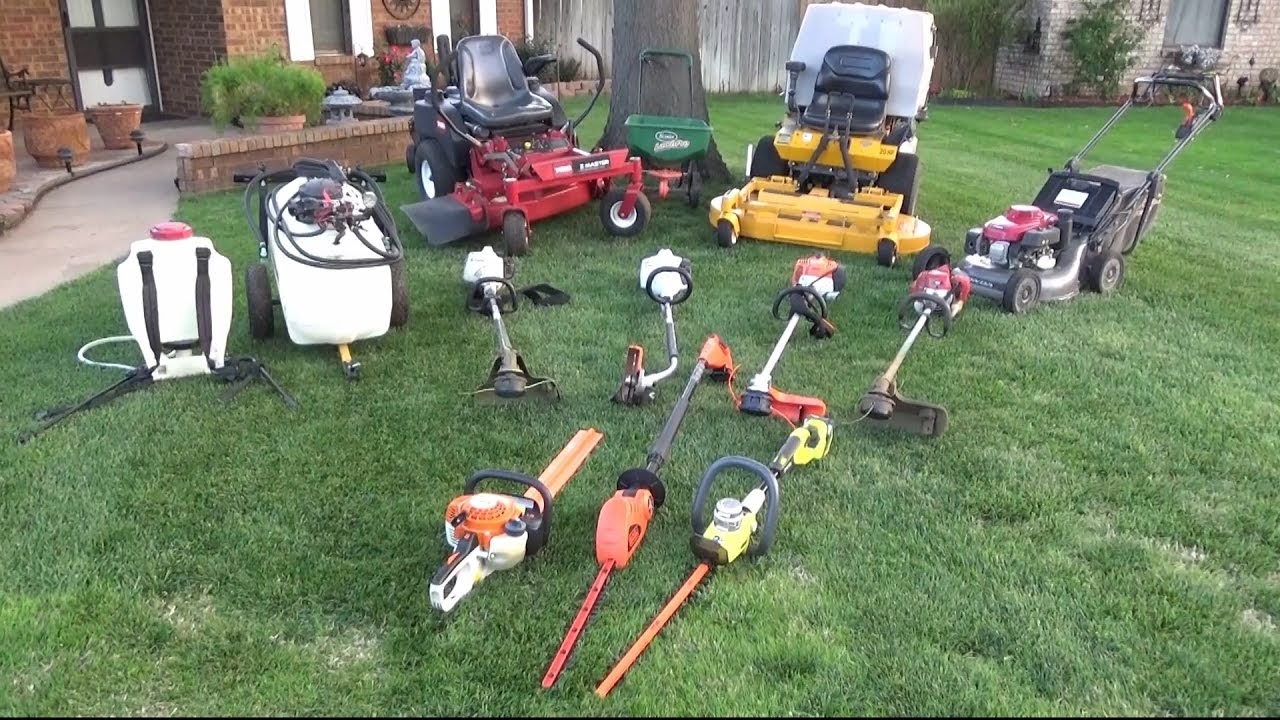Home>Garden Essentials>How Much Does It Cost To Start A Landscaping Business


Garden Essentials
How Much Does It Cost To Start A Landscaping Business
Modified: March 24, 2024
Starting a landscaping business doesn't have to break the bank. Discover the cost of turning your green thumb into a thriving garden business.
(Many of the links in this article redirect to a specific reviewed product. Your purchase of these products through affiliate links helps to generate commission for Storables.com, at no extra cost. Learn more)
Introduction
Welcome to the world of landscaping! If you have a passion for gardening, design, and outdoor spaces, starting a landscaping business can be a fulfilling and rewarding venture. Not only do you get to work with nature and create beautiful landscapes, but you also have the opportunity to turn your passion into a profitable enterprise.
However, like any other business, starting a landscaping venture requires careful planning and financial considerations. In this article, we will explore the various costs involved in starting a landscaping business. From research and planning to equipment and marketing expenses, we will provide you with an overview of the financial aspects you need to consider.
Before diving into the costs, it’s important to note that the specific expenses can vary depending on factors such as your location, the size of your business, and the services you offer. Therefore, it’s crucial to conduct thorough research and create a comprehensive business plan tailored to your unique circumstances.
So, if you’re ready to dig in and learn about the costs involved in starting a landscaping business, let’s get started!
Key Takeaways:
- Starting a landscaping business involves careful planning and financial considerations, including research, equipment, marketing, and legal requirements.
- Professional training, maintenance, and miscellaneous expenses are essential for the success and sustainability of a landscaping business.
Research and Planning
Before embarking on your landscaping business journey, conducting thorough research and creating a solid business plan is essential. This phase will help you understand the market landscape, identify your target audience, and define your unique selling proposition.
During the research phase, you will want to analyze your local market to understand the demand for landscaping services, the competition, and pricing trends. This will enable you to position your business strategically and differentiate yourself from competitors.
Additionally, you’ll need to define your target audience. Are you catering to residential clients, commercial clients, or both? Understanding your target audience will help you tailor your services and marketing efforts accordingly.
Creating a comprehensive business plan is crucial for the success of your landscaping business. It will serve as a roadmap, outlining your goals, financial projections, marketing strategies, and operational procedures. You can include details such as service offerings, pricing structures, and plans for expansion.
While you can create a business plan on your own, it may be beneficial to consult with professionals, such as business advisors or landscapers who have already established successful businesses. They can provide valuable insights and guidance to help refine your plan and ensure its feasibility.
Researching and planning are ongoing processes that should continue even after your business is up and running. You will need to stay updated on industry trends, explore new technologies or techniques, and constantly adapt your strategies to meet the evolving needs of your customers.
Remember, your research and planning phase sets the foundation for your landscaping business. Investing time and effort into understanding the market and creating a solid plan will greatly increase your chances of success. So take the time to do your due diligence, and let your vision come to life!
Business Registration and Licensing
Once you have completed your research and planning, the next step is to register your landscaping business and obtain the necessary licenses and permits. This process ensures that your business operates legally and complies with local regulations.
The specific requirements for business registration and licensing can vary depending on your location. However, here are some general steps to guide you through the process:
- Choose a business structure: Decide whether you want to establish a sole proprietorship, partnership, limited liability company (LLC), or corporation. Each structure has its own legal and tax implications, so consult with a legal professional or accountant to determine the best option for your business.
- Choose a business name: Select a unique and memorable name for your landscaping business. Check with your local business registration office or Secretary of State to ensure that the name is not already in use.
- Register your business: Register your business with the appropriate government authorities. This typically involves filing the necessary paperwork and paying registration fees. You may also need to obtain a tax identification number from the Internal Revenue Service (IRS) if you plan to hire employees.
- Obtain licenses and permits: Research the licenses and permits required for landscaping businesses in your area. This may include a general business license, a landscaping contractor license, and permits for operating vehicles or applying chemicals.
- Insurance: Consider obtaining business insurance to protect your assets and liability. General liability insurance and workers’ compensation insurance are common types of coverage for landscaping businesses.
It’s important to note that these steps serve as a general guide, and the specific requirements may vary based on your location and the services you offer. It’s advisable to consult with a local business advisor or attorney who is familiar with the regulations in your area to ensure that you meet all the necessary legal obligations.
By completing the business registration and licensing process, you establish the legitimacy of your landscaping business and gain the confidence of your clients. Operating legally also protects you from potential legal issues and allows you to focus on delivering exceptional landscaping services to your customers.
Equipment and Tools
When starting a landscaping business, acquiring the necessary equipment and tools is essential to provide quality services to your clients. The specific equipment you need will depend on the services you offer, but here are some common tools and machinery used in the landscaping industry:
- Lawnmower: A lawnmower is a fundamental tool for maintaining and trimming grass. Consider investing in a professional-grade lawnmower that suits the size and terrain of the properties you’ll be servicing.
- Trimmer and Edger: Trimmers and edgers are used to clean up the edges of lawns and trim around obstacles like trees and sidewalks. Cordless electric or gas-powered models provide flexibility and mobility.
- Hedge Trimmer: Hedge trimmers are used to shape and maintain hedges and shrubs. Look for lightweight models with adjustable blades for versatility.
- Leaf Blower: Removing leaves and debris from lawns, driveways, and walkways is made easier with a leaf blower. Choose a model with adjustable speed settings and consider opting for a backpack style for improved maneuverability.
- Irrigation System: If you plan to offer irrigation services, you may need to invest in equipment such as sprinklers, hoses, and controllers. Consider both manual and automated systems to cater to different client needs.
- Garden Tools: Various hand tools like shovels, rakes, pruning shears, and garden gloves are essential for tasks such as planting, weeding, and pruning. Invest in high-quality tools that are durable and comfortable to use.
- Truck or Trailer: Depending on the size and nature of your projects, you may need a truck or trailer to transport equipment, materials, and plants. Consider the payload capacity and towing capabilities when selecting a vehicle.
When purchasing equipment, it’s important to strike a balance between quality and cost. While you want to invest in reliable and durable tools, it’s also important to consider your budget and the specific needs of your business. You may even consider renting certain equipment, especially if you’re just starting out or for occasional specialized projects.
Additionally, don’t forget about safety equipment and protective gear. This includes items such as gloves, safety glasses, ear protection, and appropriate clothing. Ensuring the safety of yourself and your employees should always be a top priority.
Remember to factor in maintenance and repair costs when budgeting for equipment. Regular maintenance and timely repairs can help extend the lifespan of your tools and ensure optimal performance.
By investing in the right equipment and tools, you will be equipped to deliver exceptional landscaping services that meet the needs and expectations of your clients. Quality tools not only enhance efficiency but also contribute to the professional image of your business.
Costs of Vehicles
As a landscaping business, having reliable transportation is crucial for the successful operation of your business. Whether it’s hauling equipment, transporting materials, or traveling to client locations, vehicles play a significant role in your daily activities. Here are some factors to consider when it comes to the costs of vehicles for your landscaping business:
Purchase or Lease: One of the main decisions you’ll need to make is whether to purchase vehicles outright or lease them. Purchasing vehicles gives you full ownership and allows you to customize and maintain them as needed. On the other hand, leasing provides flexibility, lower upfront costs, and the opportunity to upgrade vehicles more frequently.
Type of Vehicles: The type of vehicles you’ll need will depend on the nature and scale of your landscaping business. For most landscaping businesses, pickup trucks or cargo vans are popular choices. Consider the size, payload capacity, and towing capabilities when choosing vehicles that can effectively transport your equipment and materials.
Condition and Age: If purchasing used vehicles, factor in their condition and age. While used vehicles may have a lower upfront cost, you should also consider potential maintenance and repair costs. It’s important to find a balance between affordability and reliability.
Insurance and Maintenance: Vehicle costs go beyond the initial purchase or lease price. You’ll need to budget for insurance premiums, which can vary depending on factors such as the type of vehicle, location, and driving record. Additionally, regular maintenance and repairs should be factored into your budget to keep your vehicles in good working condition.
Fuel and Operating Expenses: The cost of fuel and other operating expenses, such as oil changes and tire replacements, should also be considered. Fuel efficiency should be a consideration when selecting vehicles to help manage ongoing fuel costs.
Branding and Signage: To promote your landscaping business, you might consider adding branding and signage to your vehicles. While this may be an additional cost, it serves as a mobile billboard, increasing brand visibility and potentially attracting new clients.
When budgeting for vehicles, it’s important to consider both short-term and long-term expenses. Evaluate your business’s needs and financial capabilities to determine the most cost-effective options for your landscaping vehicles.
Lastly, it’s worth noting that there may be tax benefits associated with owning or leasing vehicles for your business. Consult with a tax professional to understand any potential deductions or credits that you may be eligible for.
By carefully assessing your needs and considering the costs associated with vehicles, you can make informed decisions that align with your budget and contribute to the success of your landscaping business.
Read more: How To Start A Landscaping Business In Texas
Office Space and Supplies
While a landscaping business primarily operates outdoors, having a designated office space can still be beneficial for administrative tasks and client communication. Here are some considerations for office space and supplies:
Office Space: Determine the amount of office space you will need based on your business size and requirements. This could range from a small home office to a commercial space. Consider factors such as the need for meeting rooms, storage areas for paperwork and equipment, and a comfortable workspace for administrative tasks.
Leasing or Purchasing: Decide whether it’s more feasible to lease or purchase your office space. Leasing provides flexibility, especially in the early stages of your business when requirements may change. Purchasing offers long-term stability and the opportunity for property appreciation.
Furniture and Equipment: Depending on the scale of your office, you may need to invest in desks, chairs, filing cabinets, and other furniture to create a productive work environment. Additionally, consider the necessary equipment such as computers, printers, scanners, and software for administrative tasks.
Communication Technology: To stay connected with your team and clients, you’ll need reliable communication technology. This includes phone systems, internet connectivity, and potentially video conferencing tools for virtual meetings.
Office Supplies: Stock up on essential office supplies such as pens, paper, notepads, folders, and other organizational tools. Consider using digital solutions like cloud storage and project management software to streamline operations and reduce paper waste.
Utilities and Maintenance: Factor in the costs of utilities such as electricity, water, heating, and cooling for your office space. Additionally, account for regular cleaning, maintenance, and repairs as needed.
Insurance and Security: Protect your office space and its contents with insurance coverage and security measures. This includes property insurance, general liability insurance, and potentially security systems or surveillance cameras.
Consider your budget and business needs when it comes to office space and supplies. If you’re just starting out or have a smaller-scale operation, you may be able to operate from a home office to keep costs down. As your business grows, you can reassess your needs and invest in a dedicated office space.
Remember, an organized and functional office space can contribute to improved efficiency and professionalism in managing the administrative aspects of your landscaping business. Take the time to create a comfortable workspace that supports productivity and reflects your brand identity.
Hiring Employees
As your landscaping business expands, you may reach a point where hiring employees becomes necessary to meet the demands of your clients and effectively manage your workload. Hiring the right employees can contribute to the growth and success of your business. Here’s what you need to consider when it comes to hiring employees:
Job Roles and Responsibilities: Determine the specific job roles and responsibilities you need to hire for. This could include general laborers, landscape designers, irrigation specialists, project managers, or administrative staff. Clearly define the qualifications, skills, and experience required for each role.
Recruitment and Hiring Process: Develop a recruitment strategy to attract qualified candidates. This may involve posting job advertisements on relevant platforms, utilizing professional networks, and conducting interviews and assessments to assess candidates’ suitability for the role. Consider seeking help from recruitment agencies or consulting with professionals who specialize in the landscaping industry.
Employee Compensation: Determine a fair and competitive compensation package for your employees. This includes considering factors such as the local job market, industry norms, and the specific responsibilities of the role. Offer a combination of salary, benefits, and incentives to attract and retain top talent.
Training and Development: Invest in training and development programs to upskill your employees and enhance their professional growth. This could include providing on-the-job training, workshops, seminars, or sponsoring certifications related to landscaping. Continuous learning opportunities can improve employee satisfaction and contribute to the overall success of your business.
Legal Obligations: Familiarize yourself with the legal obligations related to employing staff. This includes adhering to labor laws, minimum wage requirements, employment contracts, and workplace safety regulations. Consult with an employment lawyer or HR professional to ensure compliance with local laws and regulations.
Managing Employees: Effectively manage your employees by establishing clear expectations, providing regular feedback and performance evaluations, and fostering a positive work environment. Effective communication, teamwork, and leadership are key elements in building a strong and dedicated team.
Remember that hiring employees is an investment in your business’s growth and capacity. Take the time to find individuals who not only possess the necessary skills but also align with your company’s culture and values. Building a talented team can contribute to the reputation, efficiency, and success of your landscaping business.
Research and create a detailed business plan to estimate startup costs for equipment, supplies, marketing, and insurance. Consider factors like location, size of the business, and services offered.
Marketing and Advertising
Effective marketing and advertising strategies are crucial for your landscaping business to attract clients, build brand awareness, and differentiate yourself from competitors. Here are some key considerations when it comes to marketing and advertising:
Target Audience: Identify your target audience based on the services you offer and the demographics of your ideal customers. Determine the specific needs and preferences of your target audience to tailor your marketing messages accordingly.
Website and Online Presence: Develop a professional website that showcases your services, previous projects, and contact information. Optimize your website for search engines by incorporating relevant keywords and ensuring it is user-friendly. Consider creating social media profiles to engage with your audience and share updates about your business.
Local Directories and Listings: Ensure your business is listed in online directories and local search listings such as Google My Business, Yelp, and Yellow Pages. Provide accurate and up-to-date information to make it easy for potential clients to find your landscaping business.
Word-of-Mouth Marketing: Encourage satisfied clients to spread the word about your business. Offer incentives for referrals or consider implementing a loyalty program to reward repeat customers. Positive word-of-mouth can greatly impact your reputation and attract new clients.
Networking and Partnerships: Build relationships with related businesses such as nurseries, garden centers, or real estate agents. Collaborate on cross-promotional efforts or participate in local community events to increase visibility and generate leads.
Print Collateral: Design and distribute professional-printed materials such as business cards, flyers, brochures, and postcards. Ensure they are visually appealing and include your contact information and a compelling call to action.
Online Advertising: Consider paid online advertising to target specific audiences or geographical areas. Platforms like Google Ads and social media advertising allow you to reach potential clients who are actively searching for landscaping services.
Content Marketing: Create informative and engaging content related to landscaping on your website and social media channels. This can include blog articles, videos, or gardening tips that showcase your expertise and provide value to your audience. This content can also help improve your search engine rankings.
Branding and Logo: Develop a strong brand identity and logo that represents your landscaping business. Consistency in branding across all marketing materials and platforms helps build recognition and visibility in the market.
Customer Reviews and Testimonials: Encourage satisfied clients to leave reviews and testimonials on your website or social media pages. Positive reviews can significantly influence potential clients’ decision-making process.
Remember to regularly review and adapt your marketing and advertising efforts based on their performance. Analyze data and feedback to identify which strategies are most effective in reaching and attracting your target audience.
By implementing a diverse mix of marketing and advertising strategies, you can increase brand visibility, generate leads, and position your landscaping business as a top choice in the market.
Insurance and Taxes
Insurance and taxes are important financial considerations for your landscaping business. Protecting your business and managing your tax obligations are crucial for long-term sustainability. Here’s what you need to know:
Insurance:
General Liability Insurance: This type of insurance protects your business in case of property damage, bodily injury, or other liabilities. It provides coverage for accidents that may occur while working on clients’ properties.
Workers’ Compensation Insurance: If you have employees, workers’ compensation insurance is typically required. It covers medical expenses and lost wages in case of work-related injuries or illnesses. Even if not legally required, it is still advisable to have this coverage.
Commercial Auto Insurance: If you have vehicles used for your landscaping business, ensure they are covered by commercial auto insurance. This insurance provides protection in case of accidents, damages, or theft involving your business vehicles.
Equipment and Property Insurance: Protect your valuable equipment, tools, and property with specialized insurance coverage. It provides peace of mind in case of loss or damage due to theft, accidents, or natural disasters.
Taxes:
Income Tax: As a business owner, you are responsible for paying federal, state, and local income taxes on your business profits. Consult with an accountant or tax professional to ensure accurate and timely filing of your tax returns.
Self-Employment Tax: As a self-employed individual, you are also subject to self-employment tax, which covers Social Security and Medicare contributions. This is in addition to income tax and must be calculated and reported accordingly.
Employment Taxes: If you have employees, you are responsible for withholding and paying their share of Social Security and Medicare taxes, as well as federal and state payroll taxes. Additionally, you may need to report and pay unemployment taxes.
Sales Tax: Depending on your location and the services you provide, you may need to collect and remit sales tax on applicable transactions. Check the regulations in your area to determine if and how sales tax applies to your landscaping business.
Record Keeping: Maintain thorough and organized records of your business income, expenses, and tax-related documents. This includes invoices, receipts, payroll records, and financial statements. Proper record-keeping is essential for accurate tax reporting and can help you in case of audits or investigations.
Consult with an accountant or tax professional who specializes in small businesses to ensure compliance with all the necessary tax requirements. They can guide you on deductions, tax planning strategies, and help you maximize your tax savings.
Similarly, work with an insurance agent or broker who understands the specific needs of landscaping businesses to ensure you have adequate insurance coverage that provides the necessary protection.
By proactively managing insurance and taxes, you can minimize financial risks, remain compliant with regulations, and ensure the financial health and stability of your landscaping business.
Read more: How Much Does It Cost For Landscaping
Professional Training and Certifications
Professional training and certifications are essential for enhancing your skills, staying updated with industry standards, and demonstrating your expertise to clients. Investing in ongoing education not only keeps you competitive but also instills confidence in your clients. Here are some key points to consider regarding professional training and certifications for your landscaping business:
Landscape Design and Horticulture: Consider enrolling in courses or workshops focused on landscape design principles, plant identification, and horticulture practices. These programs will equip you with the knowledge necessary to create stunning and sustainable landscapes.
Irrigation Systems and Water Management: As water conservation becomes increasingly important, gaining expertise in irrigation systems and water management can set you apart. Explore training programs that cover efficient irrigation techniques, water-saving technologies, and stormwater management.
Environmental Sustainability: Stay updated on sustainable practices and environmentally friendly landscaping techniques. This includes understanding native plant species, organic gardening methods, and eco-friendly landscaping materials. Certification programs in sustainable landscaping can demonstrate your commitment to environmental stewardship.
Professional Associations: Joining professional associations related to landscaping, such as the National Association of Landscape Professionals (NALP), can provide access to valuable resources, networking opportunities, and industry updates. These associations often offer certification programs specific to the landscaping industry.
Specialized Certifications: Consider pursuing specialized certifications in specific areas of landscaping that align with the services you offer. For example, you might obtain a certification in tree care, landscape lighting, or landscape maintenance. These certifications demonstrate your expertise and dedication to professional development.
Safety Certifications: Prioritize safety training for yourself and your employees. Look for certifications in safety practices such as first aid and CPR, pesticide application, or equipment operation. These certifications enhance your credibility and ensure a safe work environment.
Continuing Education: Commit to lifelong learning by participating in workshops, seminars, and industry conferences. These events provide opportunities to stay updated on the latest trends, technologies, and best practices in the landscaping industry.
Apprenticeships and Mentorship: Consider apprenticeship programs or mentorship opportunities where you can learn from experienced professionals in the field. Hands-on experience under the guidance of seasoned experts can greatly enhance your skills and knowledge.
Investing in professional training and certifications demonstrates your commitment to excellence and positions your landscaping business as a trusted and knowledgeable service provider. Clients are more likely to choose a landscaping company that has trained professionals capable of delivering high-quality work.
Stay informed about the educational opportunities and certifications available in the landscaping industry, and select the ones that align with your business objectives and client expectations. By continually expanding your expertise, you can position your landscaping business for continued growth and success.
Maintenance and Repairs
Maintenance and repairs are critical aspects of running a landscaping business. Properly maintaining your equipment, tools, and vehicles ensures their longevity and efficiency, while timely repairs help minimize downtime and prevent more significant issues. Here’s what you need to consider when it comes to maintenance and repairs:
Equipment and Tools:
Regular maintenance of your equipment and tools is essential for their optimal performance. Develop a routine maintenance schedule that includes tasks such as cleaning, lubricating, sharpening blades, and replacing worn-out parts. Check the manufacturer’s recommendations and guidelines for specific maintenance procedures.
Keep detailed records of maintenance activities, including dates, performed tasks, and any repairs. This documentation helps track the history of each piece of equipment and facilitates troubleshooting in case of issues.
Be proactive in addressing maintenance needs, as neglecting maintenance can lead to more significant equipment failures and costly repairs. It’s often more cost-effective to invest in preventive maintenance than to deal with unexpected breakdowns.
Vehicles:
Regular maintenance of your business vehicles is crucial for their longevity and reliability. Follow the recommended maintenance schedule provided by the manufacturer, which includes oil changes, tire rotations, brake inspections, and fluid checks.
Ensure that all vehicles are inspected and serviced by qualified mechanics. Keep records of maintenance activities, repairs, and any warranty claims.
Addressing smaller maintenance issues promptly can prevent them from escalating into more severe problems. Regularly inspect the vehicles for signs of wear and tear, and address any concerns promptly.
Facilities:
If you have a physical office or storage space, regular maintenance is necessary to keep them in good condition. This includes tasks such as cleaning, organizing, and addressing any structural issues or repairs.
Develop a routine cleaning schedule to maintain a safe and pleasant working environment. Regularly inspect the premises for any maintenance needs, such as plumbing or electrical issues, and address them promptly.
Investing in professional services, such as pest control or landscaping for your own premises, can help maintain the appearance and functionality of your facilities.
Budgeting for Repairs:
Even with proper maintenance, repairs may still be necessary. Budgeting for repairs ensures that you have the financial resources to address unexpected issues as they arise.
Consider setting aside a portion of your revenue for a repair and maintenance fund. This way, you’ll have funds readily available for unforeseen repairs without disrupting your cash flow.
Regularly review and update your budget to account for maintenance and repair expenses. Consult with industry professionals or suppliers to get a better understanding of the potential costs associated with maintenance and repairs for your specific equipment and vehicles.
By implementing regular maintenance practices and addressing repairs promptly, you can extend the lifespan of your equipment and vehicles, minimize downtime, and ensure that your landscaping business operates efficiently. Remember, maintenance and repairs are investments in the longevity and dependability of your assets, ultimately contributing to the success of your business.
Miscellaneous Expenses
Running a landscaping business involves various miscellaneous expenses that may not fall under specific categories but are still essential for your operations. These miscellaneous expenses can vary depending on the unique needs of your business. Here are some common miscellaneous expenses to consider:
Office Supplies and Technology: Apart from the basic office supplies mentioned earlier, you may have additional needs such as software subscriptions, computer upgrades, and phone systems. These expenses are necessary to facilitate smooth communication, organization, and productivity in your office.
Professional Services: You may require the assistance of professionals in certain areas of your business. This can include hiring an accountant or bookkeeper to manage your finances, a lawyer to assist with legal matters and contracts, or a business consultant to provide guidance on growth strategies. While these services may seem like an added expense, they can save you time, prevent costly mistakes, and ensure compliance with regulations.
Travel and Transportation: Depending on the nature of your business, you may have expenses related to travel and transportation. This can include fuel costs, vehicle maintenance for your business vehicles, and even accommodations and meals if you have projects that require overnight stays. Keep track of these expenses to accurately calculate your tax deductions.
Professional Memberships and Subscriptions: Consider joining industry associations or subscribing to trade publications that provide valuable industry insights, access to resources, and networking opportunities. These memberships and subscriptions can help you stay updated with the latest trends, techniques, and industry news.
Advertising and Marketing Materials: In addition to the marketing strategies mentioned earlier, you may have miscellaneous expenses related to advertising and marketing materials. This includes items such as signage, branded clothing or uniforms, vehicle wraps, giveaways, or promotional merchandise.
Training and Workshops: Continuing education and professional development are important investments in the success of your landscaping business. Allocate a portion of your budget for attending workshops, seminars, or industry conferences that offer opportunities to enhance your skills, gain new knowledge, and network with peers in the industry.
Accounting Software and Services: Invest in accounting software or hire a professional bookkeeper to help you manage your finances, tracking income and expenses, generating financial reports, and ensuring accurate record-keeping. This will simplify financial management and facilitate tax preparation.
Licenses and Permits: While mentioned earlier, licenses and permits can fall under miscellaneous expenses depending on the specific requirements in your locality. Budget for the initial costs of obtaining licenses and permits, as well as renewals or updates required periodically.
Insurance Premiums: Apart from the specific insurance types mentioned earlier, there may be additional insurance coverage you choose to invest in, such as professional liability insurance or business interruption insurance. These premiums provide added protection and peace of mind for your business.
As with any miscellaneous expenses, it’s important to budget for these items and track them consistently. By accounting for miscellaneous expenses, you can ensure you have a comprehensive view of your business’s financial health and properly allocate resources to support its growth and success.
Conclusion
Starting and running a successful landscaping business requires careful planning, financial considerations, and a deep understanding of the industry. By exploring the various costs involved in starting a landscaping business, we have provided you with an overview of the financial aspects to consider. From research and planning to equipment and marketing expenses, each aspect plays a crucial role in the growth and success of your venture.
Research and planning lay the foundation for your landscaping business, enabling you to understand your target market, define your unique selling proposition, and create a solid business plan. Business registration and licensing ensure that your operations are legal and compliant with local regulations.
Investing in quality equipment and tools, as well as reliable vehicles, allows you to provide exceptional services to your clients. Office space and supplies create a professional working environment for administrative tasks and client communication.
As your business grows, hiring employees becomes a necessity to meet client demands and expand your capabilities. Marketing and advertising efforts help promote your business, attract and retain clients, and set you apart from competitors.
Insurance and taxes are crucial aspects of responsible business ownership, protecting your assets and ensuring compliance with legal obligations. Professional training and certifications allow you to enhance your skills, stay updated with industry standards, and demonstrate your expertise to clients.
Maintenance and repairs are important for the longevity and efficiency of your equipment, tools, vehicles, and facilities. Miscellaneous expenses encompass a range of crucial but varied costs that arise in the day-to-day operations of your landscaping business.
Success in the landscaping industry requires a combination of practical knowledge, creativity, and business acumen. By carefully considering and managing these financial aspects, you can position your landscaping business for long-term sustainability and growth.
Remember, the specific costs and considerations may vary based on your location, business size, and services offered. It is important to conduct thorough research, seek expert advice when needed, and continuously adapt to the evolving needs of the market.
With a solid financial foundation and a passion for creating beautiful outdoor spaces, your landscaping business has the potential to thrive and flourish. As you embark on this exciting journey, embrace challenges, continuously learn, and provide exceptional services that exceed the expectations of your clients. Good luck on your landscaping business venture!
Frequently Asked Questions about How Much Does It Cost To Start A Landscaping Business
Was this page helpful?
At Storables.com, we guarantee accurate and reliable information. Our content, validated by Expert Board Contributors, is crafted following stringent Editorial Policies. We're committed to providing you with well-researched, expert-backed insights for all your informational needs.














0 thoughts on “How Much Does It Cost To Start A Landscaping Business”